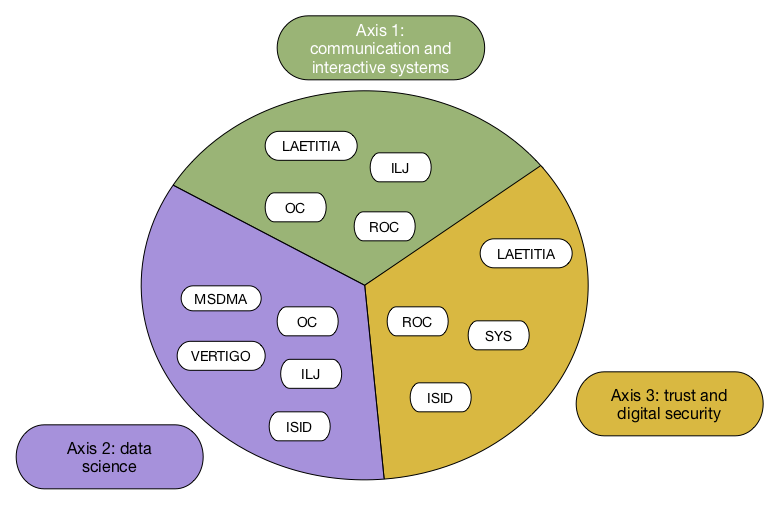The Cédric lab develops its research on three major axes. Each of Cédric’s eight teams contributes to the coordination and development of the axes according to their scientific expertise, as summarized below.

Axis 1: communicating and interactive systems
The development of networks and exchanges, both between users of digital systems and within these systems themselves, creates new challenges for telecommunications systems as well as for the design of human-machine interactions. These technologies must be developed to provide the communication and computing power necessary for an ever more connected industry, for the deployment of autonomous vehicles, for video games, and therefore more generally for the interconnection of people and digital and robotic systems.
The teams contributing to this axis develop research aimed at responding to these new societal needs at three complementary levels:
- signal processing algorithms for the physical layer;
- distributed and virtualized communication and computing networks and systems;
- design of interactive objects and systems, and evaluation of their use.
Teams: ROC, LAETITIA, OC et ILJ
Axis 2: data science
The continued growth and the wide variety of data on a very large scale are the triggers for the new effectiveness of artificial intelligence (AI) methods in a wide spectrum of applications. In the age of social networks and connected devices that continuously collect information, the demand for systems capable of producing useful information from vast amounts of data is greater than ever. The power of new computing devices also poses new challenges for algorithmic or statistical methods, and opens up unexplored avenues of research.
The teams in this axis develop research devoted to the representation of symbolic or digital data, to the management of their quality as well as to the extraction of knowledge by methods based on statistical modelling, machine learning, reasoning or algorithmic.
Teams: MSDMA, VERTIGO, OC, ILJ et ISID
Axis 3: trust and digital security
Computer systems are everywhere. A citizen of a developed country requests on average more than a hundred digital devices in a day, without always being aware of it. The tasks performed by these systems are often critical: the cost, human or financial, of a malfunction, be it caused by a lack of security or an intentional attack, can be extremely high. Confidence in current or future systems is therefore a sine qua non for the development of our digital societies.
The teams in this area are exploring techniques to guarantee the security, safety and reliability of the hardware, software and information systems of tomorrow.
